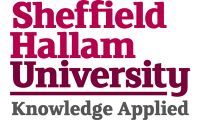
Sheffield Hallam University’s Transforming Lives Fellowships scheme seeks to attract and develop diverse applicants through an inclusive recruitment process
UK universities are experiencing a positive shift in the research landscape. Significant increases in public funding for areas of research and innovation – including health, artificial intelligence and data analytics, climate action and the social sciences – are available to institutions such as Sheffield Hallam University, where an ambitious new programme is being launched to develop the next generation of research leaders.
The Transforming Lives Fellowships scheme comes as part of Sheffield Hallam’s bold new research and innovation strategy. The scheme will run for at least three years and appoint 40 new permanent professors and associate professors, with appointments made on a rolling basis.
“It’s a really big deal for the university to operate something like this at this scale,” explains Rory Duncan, pro-vice-chancellor of research and innovation at Sheffield Hallam University.
“We have spectacular research facilities and also the space to welcome more people to the university,” he says. “Our university mission statement is ‘transforming lives’ and we want the research undertaken at Sheffield Hallam to continue to make a real-world difference.”
The scheme’s initial focus is on four priority areas: artificial intelligence, data analytics and robotics; lifelong health and wellbeing; climate action and energy; and an inclusive and just society.
“It is essential to us that we are inclusive in our appointment process, and we really want to continue to diversify our staff base in the university,” says Duncan. “We’re already making very good strides towards that, but there's always more that we can do, especially at leadership level.”
To this end, there are two routes for candidates to register their interest. The first is a “short expression of interest”, made through the scheme’s website. The idea behind this is to simplify and demystify the application process. “This option allows people to have an informal conversation with us before deciding to apply,” Duncan explains. “We know that some people, including women, don’t apply for roles unless they are certain they fulfil all requirements. This route allows potential candidates to explore their fit with us.”
The second route is a full application, which uses a narrative CV approach, something increasingly adopted in the sector as a more inclusive means of learning about candidates’ skills.
This application route asks four open questions, “each designed to help people think about how the work they’re doing is making a difference in the real world – somewhat moving away from the traditional approach of asking for a list of published outputs”, says Duncan. “We’re looking for people who've got potential, in the knowledge that some of those people may not have followed the ‘usual’ academic career pathway. They may not have academic publications, so we need them to be able to evidence the differences they’ve made in other ways.”
The first year of the fellowships will be dedicated to establishing research, but over three years, fellows will transition to full academic roles, which will include teaching. “It's really important for students to see the power of research and understand what it's for,” Duncan explains.
“This is also about ensuring that people have a rounded career and are supported to succeed wherever they can contribute. We have a superb working environment and major initiatives in place to support people,” he concludes.
Find out more about the Transforming Lives Fellowships scheme.
